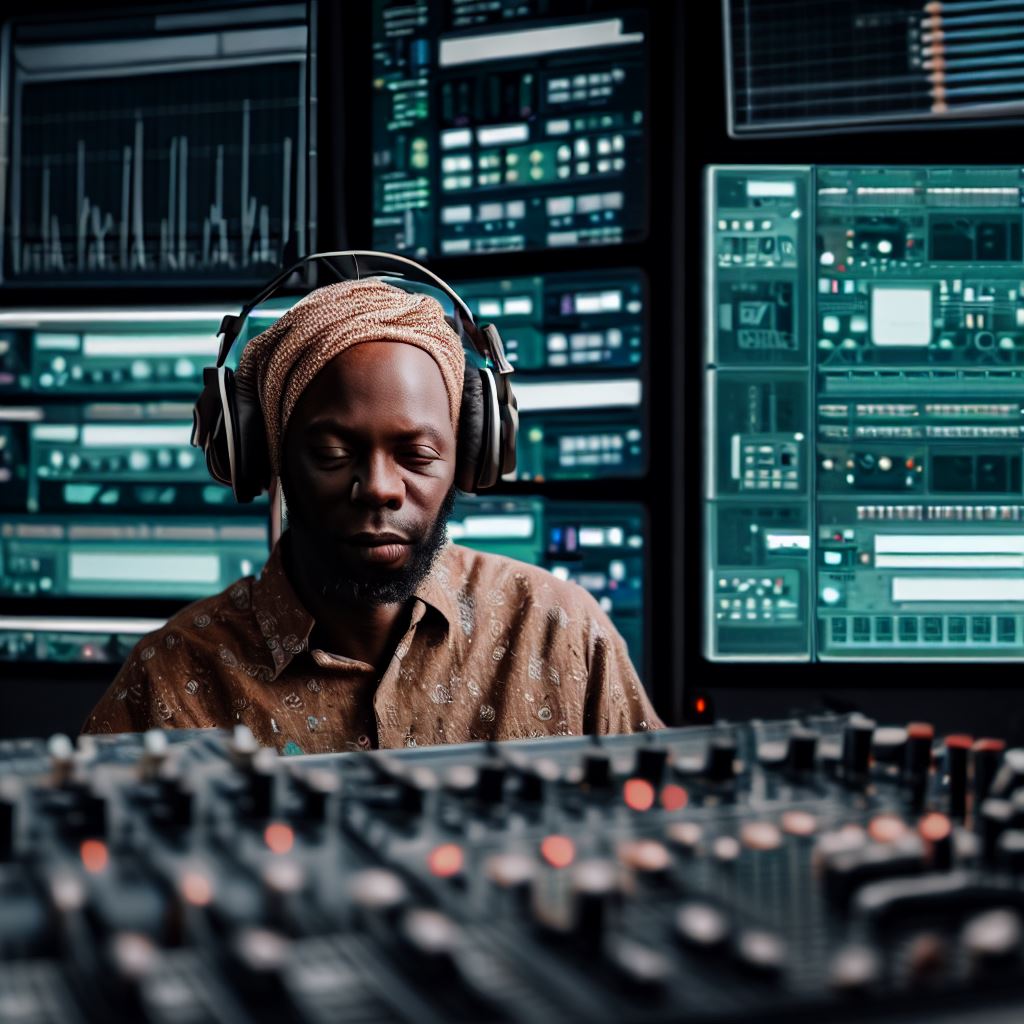Introduction
Let’s talk about sound engineering field in Nigeria.
Sound engineering is the technical and creative process of recording, manipulating, and reproducing sound.
The demand for sound engineers is increasing globally as industries like music, film, and theatre depend on high-quality sound production.
In Nigeria, the sound engineering industry is experiencing significant growth, with a rise in music production, live concerts, and film projects.
The emergence of new recording studios, sound equipment vendors, and educational institutions specializing in sound engineering reflects this trend.
Nigeria’s vibrant music scene, Nollywood film industry, and expanding entertainment sector contribute to the demand for skilled sound engineers.
The country’s rich cultural heritage and diverse musical genres provide ample opportunities for sound engineers to showcase their talent and expertise.
The future of sound engineering in Nigeria looks promising, with potential for both local and international collaborations in music production, film soundtracks, and live events.
This blog section will explore the various aspects of sound engineering in Nigeria, including its challenges, opportunities, and the role of technology in shaping the industry’s growth.
Overview of Sound Engineering
Sound engineers are indispensable across industries like music, film, TV, and live events.
They record, mix, and edit audio to create captivating experiences.
These professionals collaborate with musicians, producers, and directors to deliver desired audio outcomes.
Acquiring skills in equipment, software, acoustics, and digital audio workstations (DAWs) is crucial.
They must grasp signal flow, possess attention to detail, problem-solving abilities, and strong communication skills.
Various roles exist within sound engineering:
- Recording engineers capture high-quality audio during studio sessions.
- Mixing engineers blend audio tracks to create balanced final mixes.
- Live sound engineers manage sound reinforcement at events.
- Sound designers create and implement audio elements for multimedia projects.
- Post-production engineers enhance and synchronize audio in film and TV.
In the music industry, sound engineers collaborate with artists and producers, capturing performances, and perfecting songs during mixing and mastering.
In film and TV, they ensure high-quality audio, both on-set and during post-production, creating immersive experiences.
For live events, sound engineers set up and manage sound systems, ensuring optimal quality and real-time adjustments.
Sound engineering offers a growing field in Nigeria with diverse opportunities.
These professionals are instrumental in delivering top-notch audio experiences, and their skills significantly impact audio quality.
Aspiring sound engineers should acquire essential skills and knowledge to excel in this dynamic profession.
Read: From Beginner to Pro: A Nigerian Sommelier’s Career Path
Evolution of Sound Engineering in Nigeria
The history of sound engineering in Nigeria reflects its evolution alongside technological advancements:
- Early Years (1960s): Limited recording resources; reliance on basic equipment like tape recorders.
- 1970s-1980s: Rise of Nigerian music artists; establishment of studios like EMI and Phonodisk Studios; improved sound engineering practices.
- 1990s: Digital audio technology’s advent revolutionized the field; DAWs and computer-based recording enabled professional-quality production.
- Growth of Sound Engineering Schools: Surge in schools and institutes offering specialized courses to meet industry demand.
Factors driving sound engineering’s growth in Nigeria:
- Music Industry Expansion: Rapid local and international growth demands high-quality music production.
- Technological Advancements: Advanced equipment and software made sound engineering more accessible.
- International Recognition: Nigerian sound engineers gained global acclaim, attracting more talent to the field.
- Government Support: Policies and initiatives bolstered the creative industry’s growth, including sound engineering.
Achievements and global recognition of Nigerian sound engineers:
- Grammy Awards: Michael Ugwu won a Grammy for his work on Burna Boy’s “African Giant.”
- Collaborations with International Artists: Partnerships with artists like Beyoncé and Drake showcased Nigerian expertise.
- Impact on Nollywood: Elevated sound production quality in Nigerian films led to international recognition.
- Award Recognition: Honored with accolades such as The Headies and Soundcity MVP Awards for contributions to the music industry.
Read: Sommelier Events in Nigeria: Networking and Learning
Growing Opportunities in the Industry
The Nigerian entertainment industry’s rapid growth fuels a rising demand for sound engineers.
They ensure high-quality audio production, essential for success in music, film, and events. Opportunities abound:
- Surging Demand: More artists, filmmakers, and event organizers need sound engineers for projects, making their role pivotal.
- Entertainment Industry Expansion: Nollywood, music labels, and live events rely on sound engineers to enhance audio quality.
- Versatile Roles: Sound engineers find employment in various sectors:
- Music Productions: They work in recording studios, capturing clear vocals and balancing instruments.
- Film Industry: Vital for synchronizing dialogue, sound effects, and music in Nigerian films.
- Live Events: Ensuring optimal sound quality at concerts and festivals is their forte.
- Television and Radio: They maintain broadcast audio quality, making content clear and distortion-free.
- Music Productions: They work in recording studios, capturing clear vocals and balancing instruments.
- Freelancing and Entrepreneurship: Sound engineers can freelance or start their businesses, offering services in music production, live events, or audio equipment rental.
Collaboration with industry peers expands networks and opportunities.
The Nigerian entertainment industry’s growth continues to drive demand for sound engineers.
Their expertise is indispensable in delivering exceptional audio experiences, making their role ever more crucial.
As the industry evolves, sound engineers will continue to enjoy increasing opportunities in Nigeria.
Read: From Beginner to Pro: A Nigerian Sommelier’s Career Path

Challenges Faced by Nigerian Sound Engineers
Nigeria is witnessing a rapid growth in the field of sound engineering.
However, with this growth comes a set of challenges that sound engineers in the country face on a regular basis.
These challenges hinder their ability to excel and contribute effectively to the industry.
Let’s delve into the common obstacles Nigerian sound engineers encounter:
- Inadequate Infrastructure
- Lack of Resources
- Low Recognition
- Inadequate Training Opportunities
- Limited Networking Opportunities
- Financial Constraints
- Inconsistent Power Supply
To address these challenges and promote growth in the field of sound engineering in Nigeria, the following solutions could prove beneficial:
- Investment in Infrastructure
- Increased Access to Resources
- Raising Awareness and Recognition
- Enhanced Training Programs
- Promoting Networking Platforms
- Financial Support Programs
- Power Backup Solutions
By addressing these challenges and implementing the suggested solutions, Nigeria can foster a conducive environment for the growth of the sound engineering field.
This, in turn, will empower sound engineers to excel in their craft and contribute significantly to the entertainment industry.
Read: Certification for Event Managers: Nigeria’s Guide
Training and Educational Resources for Sound Engineers
In recent years, the field of sound engineering has witnessed significant growth and development in Nigeria.
As a result, the availability of academic programs and specialized courses in sound engineering has increased, providing aspiring sound engineers with various opportunities to gain the necessary knowledge and skills in this field.
Availability of Academic Programs and Specialized Courses
- Nigeria now boasts several institutions offering academic programs in sound engineering.
- These programs are designed to provide students with a comprehensive education in the technical and creative aspects of sound engineering.
- Some notable Nigerian universities and polytechnics offering sound engineering programs include the University of Lagos, Lagos State Polytechnic, and the Federal College of Education (Technical), Akoka.
- These academic programs typically cover a wide range of topics, including audio recording, acoustics, music production, mixing and mastering, and live sound production.
- Moreover, specialized courses and certifications in sound engineering are available through institutions such as the Tenstrings Music Institute and the Royal Arts Academy.
- These short-term courses are ideal for individuals who want to acquire specific skills or enhance their existing knowledge in sound engineering.
Notable Institutions Providing Sound Engineering Education
- The University of Lagos (UNILAG) is renowned for its Bachelor of Science in Electrical Engineering with a specialization in Audio and Multimedia Systems Engineering.
- This program equips students with the technical expertise required to work in various areas of sound engineering.
- Lagos State Polytechnic (LASPOTECH) offers a Higher National Diploma (HND) program in Music Technology.
- This program focuses on music production, sound design, and audio post-production.
- The Federal College of Education (Technical), Akoka offers a National Certificate of Education (NCE) program in Music Education with a specialization in Sound Engineering.
- Students in this program gain a solid foundation in sound engineering principles and practices.
Online Resources, Workshops, and Internships
Besides formal academic programs, aspiring sound engineers can take advantage of various online resources, workshops, and internships to further enhance their skills and knowledge.
- Online platforms like Coursera, Udemy, and LinkedIn Learning offer a wide range of courses in sound engineering.
- These courses provide flexibility and allow individuals to learn at their own pace.
- Additionally, attending workshops and seminars organized by industry professionals can be beneficial in gaining practical insights and networking opportunities.
- Internships at recording studios, production houses, and event management companies can provide valuable hands-on experience in sound engineering.
- Such internships not only develop technical skills but also help individuals understand the dynamics of the industry.
In short, the field of sound engineering in Nigeria is experiencing growth, and this has led to an increased availability of academic programs and specialized courses.
Aspiring sound engineers have the opportunity to receive formal education from reputable institutions while also exploring online resources, attending workshops, and gaining practical experience through internships.
With the right training and resources, individuals can pursue successful careers in the thriving field of sound engineering in Nigeria.
See Related Content: Nigeria’s Fire Service: A Career Path Less Traveled
Success Stories of Nigerian Sound Engineers
- David Awoyemi: Renowned Nigerian sound engineer with credits on hits by Burna Boy, Wizkid, and Tiwa Savage.
- Ade Bantu: Multitalented artist, producer, and sound engineer known for influential projects.
- Myke Pam: Accomplished sound engineer on notable albums for Asa, Brymo, and Omawumi.
- Bigfoot: Highly regarded for shaping the Nigerian music industry, working with artists like Davido and Olamide.
- Samjazzy (Samson Ohdafe): Known for his work on popular songs by Timaya and Phyno.
These Nigerian sound engineers exemplify success through dedication, skill, and unwavering passion.
Their contributions to the industry are invaluable and inspirational.
David Awoyemi’s journey began at a young age, experimenting with sounds and collaborating with top Nigerian artists.
His talent and persistence made him a sought-after sound engineer, shaping hit songs.
Ade Bantu’s unique path from musician to sound engineer showcases his exceptional skills and ability to elevate every artist he works with.
Myke Pam’s story underscores the importance of continuous learning and growth.
Starting as an intern, he evolved into a top sound engineer known for his work on acclaimed albums.
Bigfoot’s impact on the Nigerian music scene is profound.
His meticulous attention to detail and artistic collaboration have solidified his reputation.
Samjazzy’s rise from a bedroom producer to working on chart-topping songs highlights the power of passion and dedication.
These success stories serve as inspiration for aspiring Nigerian sound engineers, emphasizing hard work, learning, and unwavering passion as keys to success.
They show that sound engineering is a rewarding field in Nigeria.
Conclusion
In a nutshell, sound engineering has experienced significant growth and has the potential for further expansion in Nigeria.
It plays a crucial role in various industries such as music, film, advertising, and live events.
Sound engineers are essential for ensuring high-quality audio production and creating immersive experiences for audiences.
They are responsible for capturing, editing, and mixing sound to enhance the overall impact of a product or performance.
The importance of sound engineering cannot be overstated as it contributes to the success of music albums, movies, commercials, and concerts.
It adds depth, clarity, and emotion to the final product and enhances the overall artistic and creative vision.
Moreover, sound engineering provides countless career opportunities for individuals with a passion for music, technology, and creativity.
It offers a path where one can merge their love for music and technical skills to create unforgettable audio experiences.
As the field of sound engineering continues to grow, it is crucial for aspiring sound engineers and enthusiasts to explore the opportunities available.
This can be through formal education, internships, networking, and continuous self-improvement.
Nigeria, with its vibrant music and entertainment industry, provides a fertile ground for sound engineers to thrive and contribute to the field’s growth.
By embracing new technologies, collaborating with artists and producers, and pushing the boundaries of innovative audio production, sound engineers can shape the future of the industry.
Therefore, I encourage readers who are interested in sound engineering to seize the opportunities available and contribute to the field’s growth in Nigeria.
By doing so, we can elevate the quality of audio production, showcase Nigerian talent, and make a lasting impact within the music and entertainment industries.




